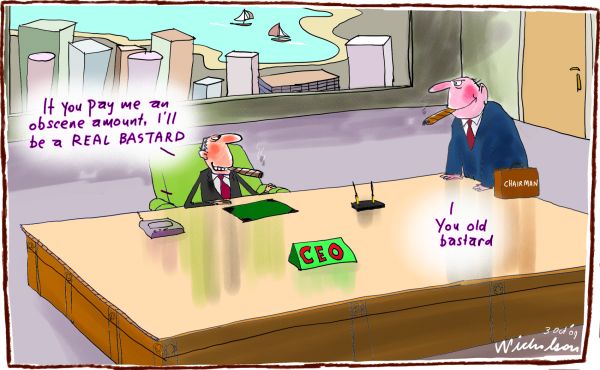Search
Democracy Links
Member's Off-site Blogs
occupy this .....

The directors of Britain's largest companies were last night condemned as "elite greedy pigs" for pocketing a 49 per cent pay rise in the past year, while average workers failed even to keep up with inflation.
Unions exploded with fury after the publication of figures that showed how boardroom pay soared in the last financial year, thanks to rising salaries, bonuses and in particular the swelling value of directors' long-term share plans. The statistics, compiled by Incomes Data Services, provide an annual snapshot of executive remuneration, as reported in companies' most recent reports to shareholders, and show that the chief executives of the FTSE 100 largest companies earned an average of £3,855,172 last year. That is an average 43 per cent rise and, adding in other directors, total earnings rose by an average 49 per cent.
According to the report, the FTSE 100 chief executive with the highest earnings last year was Michael Davis of the mining conglomerate Xstrata, who pocketed £18.4m, closely followed by Bart Becht of Reckitt Benckiser, which makes Nurofen, Calgon dishwasher powder and Durex condoms.
Steve Tatton, the report's editor, said the large increases represented the rising value of long-term share incentive plans, which were accumulated over time. "Britain's economy may be struggling to return to pre-recession levels of output, but the same cannot be said of FTSE 100 directors' remuneration. The generous remuneration packages that FTSE 100 directors now receive indicate a marked improvement in boardroom fortunes," he said.
Union leaders' outrage was only stoked by a second IDS report, also released yesterday, showing that the average private-sector pay award this summer gave workers a raise of just 2.6 per cent - half the most recent annual inflation figure.
"This is another shining example of how the elite greedy pigs who run our top companies behave," said Paul Kenny, general secretary of the GMB, which recently published a survey of 294 occupations covering 90 per cent of the British workers that showed they had seen drops in living standards of up to 20 per cent in some sectors.
"Apart from these FTSE directors and chief executives, everyone from plasterers to IT specialists, from travel agents to midwives, and hairdressers to police inspectors has seen the value of their earnings drop. It has got a lot worse in the past year as the recovery stalled," he added.
The IDS report is set to reignite demands for the Government to curb executive pay, and the Unite union last night called for shareholders to be given more power to hold directors accountable. "The Government should strongly consider giving shareholders greater legal powers to question and curb these excessive remuneration packages," said the union's general secretary Len McCluskey. "Institutional shareholders need to exercise much greater scrutiny and control of directors' pay and bonuses. It's obscene and it shows that the City has learnt nothing during the financial troubles of the last four years."
The TUC called for worker representation on company boards as a way of trying to narrow the gap between boardroom and shop-floor pay.
"Boardroom pay rewards are a brazen stitch-up," said Brendan Barber, the TUC's general secretary. "Top directors have used tough business conditions to impose real wage cuts, which have hit people's living standards and the wider economy, but have shown no such restraint with their own pay. Reform should start with employee representation on remuneration committees, which would give directors a much-needed sense of reality."
FTSE 100 directors' salaries rose by little more than 3 per cent, but the mean bonus was £906,044, up an average 23 per cent on 2010. Long-term incentive plan values made up the bulk of their earnings increase.
Mr Tatton said companies might find it "hard to justify" the rises at a time of falling living standards for many employees. "With closer scrutiny of boardroom pay expected in the future, remuneration committees will have to make sure that they are able to provide full justifications for the bonuses awarded," he said. "This means that they will have to be much more transparent about how total benefits packages are structured and how performance is measured."
Pay day: Top earning chief executives:
Mick Davis (Xstrata) £18,426,105
Bart Becht (Reckitt Benkiser) £17,879,000
Michael Spencer (ICAP) £13,419,619
Sir Terry Leahy(Tesco) £12,038,303
Tom Albanese (Rio Tinto) £11,623,162
Sir Martin Sorrell (WPP Group) £8,949,985
Todd Kozel (Gulf Keystone Petroleum) £8,913,223
Don Robert (Experian) £8,601,984
Edward Bonham Carter (Jupiter Fund Management) £8,003,641
Dame Marjorie Scardino (Pearson) £8,003,641
- By John Richardson at 28 Oct 2011 - 12:34pm
- John Richardson's blog
- Login or register to post comments
Recent comments
10 hours 6 min ago
10 hours 11 min ago
11 hours 14 min ago
15 hours 44 min ago
16 hours 54 min ago
17 hours 4 min ago
18 hours 18 min ago
1 day 6 hours ago
1 day 6 hours ago
1 day 6 hours ago